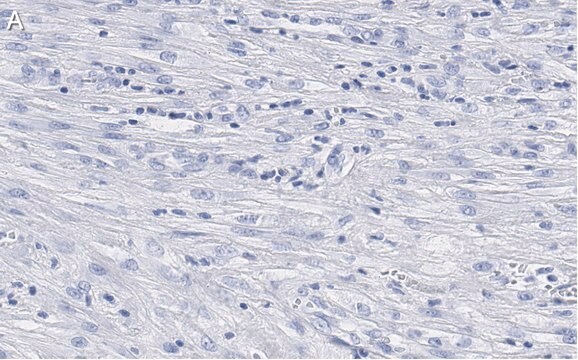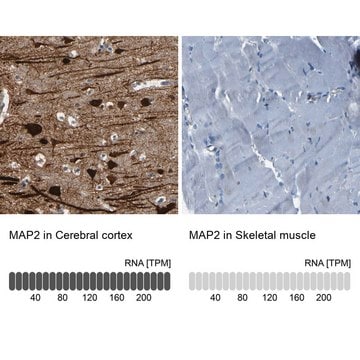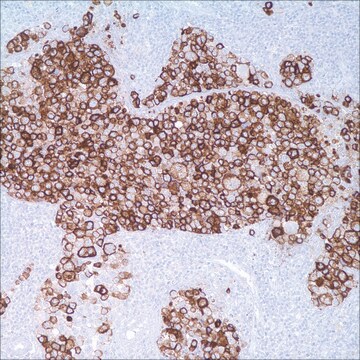General description
We are committed to bringing you greener alternative products, which adhere to one or more of The 12 Principles of Green Chemistry. This antibody is Preservative-free, produced without the harm or sacrifice of animals and exceptionally stable to allow for ambient shipping and storage if needed and thus aligns with "Waste Prevention", "Designing Safer Chemicals" and "Design for Energy Efficiency".
Click here for more information.
ZooMAb® antibodies represent an entirely new generation of recombinant monoclonal antibodies. Each ZooMAb® antibody is manufactured using our proprietary recombinant expression system, purified to homogeneity, and precisely dispensed to produce robust and highly reproducible lot-to-lot consistency. Only top-performing clones are released for use by researchers. Each antibody is validated for high specificity and affinity across multiple applications, including its most commonly used application. ZooMAb® antibodies are reliably available and ready to ship when you need them.
Specificity
Clone 1H20 is a ZooMAb® rabbit recombinant monoclonal antibody that specifically detects S-methyl-5′-thioadenosine phosphorylase (MTAP).
Immunogen
His-tagged, full-length, recombinant human S-methyl-5′-thioadenosine phosphorylase (MTAP).
Application
Quality Control Testing
Evaluated by Western Blotting in HT-29 cell lysate.
Western Blotting Analysis: A 1:1,000 dilution of this antibody detected MTAP in HT-29 cell lysate.
Tested Applications
Western Blotting Analysis: A 1:1,000 dilution from a representative lot detected MTAP in lysate from HepG2 cells and 1:10,000 dilution in lysate from RAW264.7 cells.
Immunocytochemistry Analysis: A 1:100 dilution from a representative lot detected MTAP in HT-29 cells.
Immunohistochemistry (Paraffin) Analysis: A 1:100 dilution from a representative lot detected MTAP in Human kidney and Human liver tissue sections.
Affinity Binding Assay: A representative lot of this antibody bound full-length, recombinant MTAP with a KD of 1.4 x 10-7in an affinity binding assay.
Note: Actual optimal working dilutions must be determined by end user as specimens, and experimental conditions may vary with the end user.
Target description
S-methyl-5′-thioadenosine phosphorylase (UniProt: Q13126; also known as EC:2.4.2.28, 5′-methylthioadenosine phosphorylase, MTA phosphorylase, MTAP, MTAPase) is encoded by the MTAP (also known as MSAP) gene (Gene ID: 4507) in human. MTAP is a ubiquitously expressed, homotrimeric enzyme that catalyzes the reversible phosphorylation of S-methyl-5′-thioadenosine (MTA) to adenine and 5-methylthioribose-1-phosphate. It is involved in the breakdown of MTA, a major by-product of polyamine biosynthesis. It is responsible for the first step in the methionine salvage pathway after MTA has been generated from S-adenosylmethionine. MTAP displays broad substrate specificity with 6-aminopurine nucleosides as preferred substrates. Loss of MTAP has been reported in a number of cancers, including osteosarcoma, malignant melanoma, and gastric cancer. Loss of MTAP results in the accumulation of MTA, and this inhibits the activity of several enzymes, including protein arginine methyltransferase 5 (PRMT5), which is a regulatory protein in cell cycle regulation and stem cell differentiation. MTAP deficiency is shown to increase the expression of CD133 that results in enhanced tumorigenicity of glioblastoma cells and promote glioma stem-like cell, which is associated with poor prognosis in glioblastoma subjects. Seven isoforms of MTAP have been described that are produced by alternative splicing. This ZooMAb® recombinant monoclonal antibody, generated by our propriety technology, offers significantly enhanced specificity, affinity, reproducibility, and stability over conventional monoclonals. (Ref.: Patro, CPK., et al. (2022). J. Transl. Med. 20; Article 620; Hanson, LJ., et al. (2019). Cancer Res. 79(13); 3383-3394).
Physical form
Purified recombinant rabbit monoclonal antibody IgG, lyophilized in PBS, 5% Trehalose, normal appearance a coarse or translucent resin. The PBS/trehalose components in the ZooMAb formulation can have the appearance of a semi-solid (bead like gel) after lyophilization. This is a normal phenomenon. Please follow the recommended reconstitution procedure in the data sheet to dissolve the semi-solid, bead-like, gel-appearing material. The resulting antibody solution is completely stable and functional as proven by full functional testing. Contains no biocide or preservatives, such as azide, or any animal by-products. Larger pack sizes provided as multiples of 25 µL.
Reconstitution
300 µg/mL after reconstitution at 25 µL per vial. Please refer to guidance on suggested starting dilutions and/or titers per application and sample type.
Storage and Stability
Recommend storage of lyophilized product at 2-8°C; Before reconstitution, micro-centrifuge vials briefly to spin down material to bottom of the vial; Reconstitute each vial by adding 25 µL of filtered lab grade water or PBS; Reconstituted antibodies can be stored at 2-8°C, or -20°C for long term storage. Avoid repeated freeze-thaws.
Other Notes
Concentration: Please refer to the Certificate of Analysis for the lot-specific concentration.
Legal Information
ZooMAb is a registered trademark of Merck KGaA, Darmstadt, Germany
Disclaimer
Unless otherwise stated in our catalog or other company documentation accompanying the product(s), our products are intended for research use only and are not to be used for any other purpose, which includes but is not limited to, unauthorized commercial uses, in vitro diagnostic uses, ex vivo or in vivo therapeutic uses or any type of consumption or application to humans or animals.










